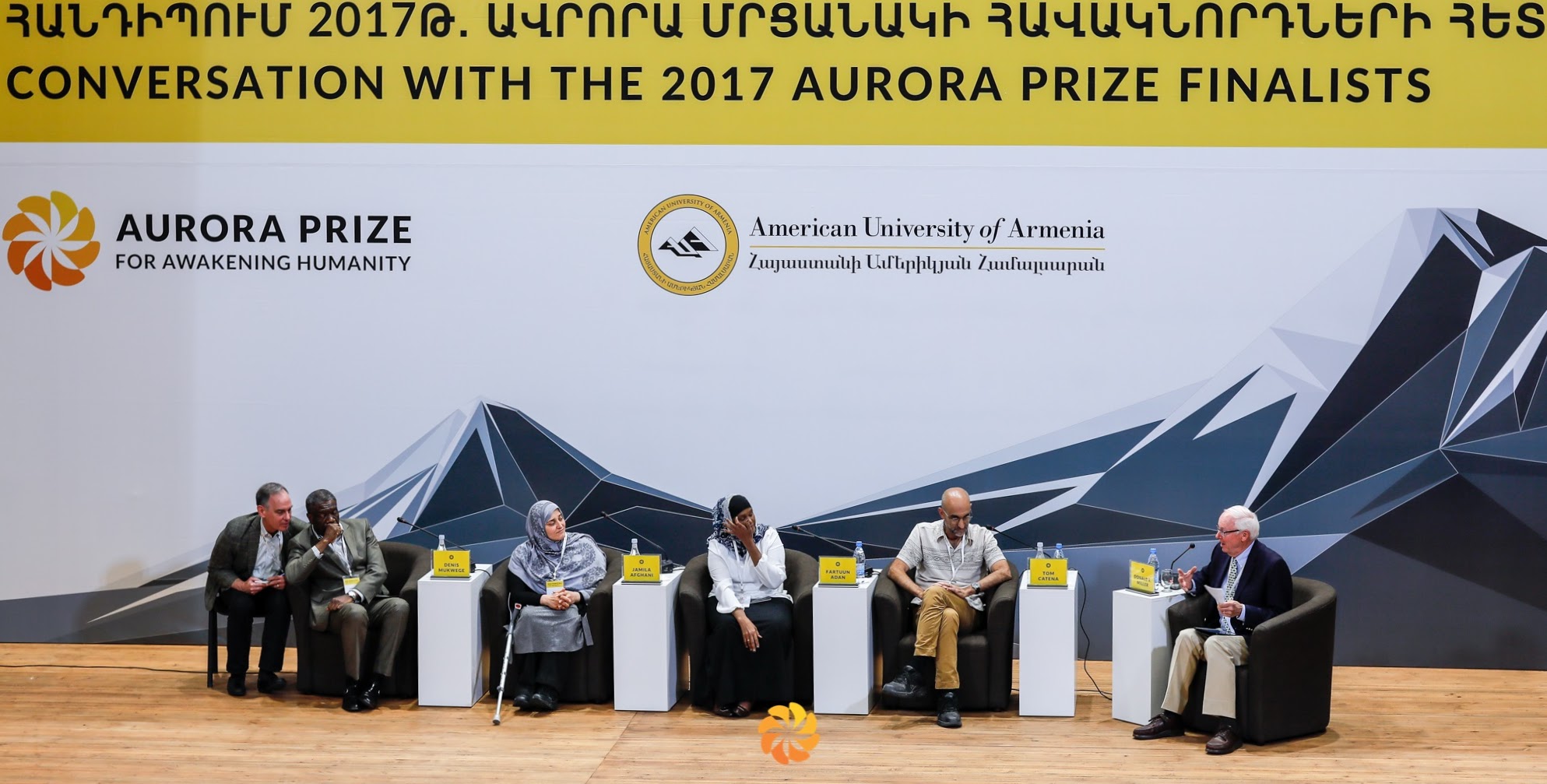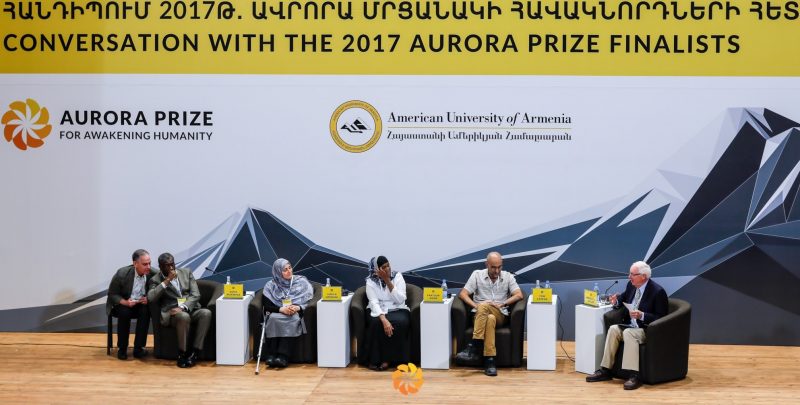
AUA Co-hosts Conversation with the 2017 Aurora Prize Finalists
3 min readYEREVAN, Armenia – On the eve of the second annual Aurora Prize Ceremony, the American University of Armenia (AUA) co-hosted Conversation with 2017 Aurora Prize Finalists with the Aurora Humanitarian Initiative. On May 26, AUA community members, university students from throughout Armenia, and others attended the event to learn about pressing human rights issues from humanitarian leaders working in the field and become a part of the global conversation. The event was one in the Aurora Dialogues series of lectures and panel discussions that have the collective goal of exchanging knowledge and perspectives on the best ways to face these global challenges through actionable change.
During the event, 2017 Aurora Prize finalists Fartuun Adan (Somalia), Denis Mukwege (D.R. Congo), Tom Catena (USA/Sudan), and Jamila Afghani (Afghanistan) each introduced their work, the causes that motivate them, and discussed the support that they need to deliver tangible change in their communities. Ms. Adan’s daughter, Ilwad Elman, and Muhammad Darwish, also 2017 Aurora Prize finalists, were unable to attend the event.
The event commenced with opening remarks delivered by AUA President Armen Der Kiureghian, Aurora Prize co-founder Ruben Vardanyan, and the first laureate of the Prize, Marguerite Barankitse. “The impact of the Aurora Prize is seen in each person sitting here today. Aurora’s story has made many people around the world renew their faith in gratitude and humanity.” Ms. Barankitse heartwarmingly stated. Their remarks were succeeded by a film screening of each of this year’s Aurora Prize finalists. The moderator of the Conversation was Donald Miller, professor of religion at the University of Southern California, who then took the stage and invited the finalists to open the discussion.
Ms. Fartuun Adan and Ms. Ilwad Elman, Founders of the Elman Peace and Human Rights Centre in Somalia are mother and daughter respectively have demonstrated unwavering dedication to protect human rights, women’s rights, and facilitate peace building, development and the rehabilitation of child soldiers amidst the country’s insecure and dangerous conditions. While her daughter stayed behind to negotiate a peaceful solution to a child hostage situation, Ms. Adan said, “The motivation for my work is that I myself am a mother. As I continue to work with these young girls who have suffered rape, abuse, and trauma, my goal is to instill in them that their lives are not over, that they have options, they have a future.”
In her commentary, Ms. Jamila Afghani, Chairperson of the Noor Educational and Capacity Development Organization in Afghanistan emphasized the importance of education. “Education is very important for the advancement of women. As I work with imams, I try to ensure that religion does not interfere with women’s ability to get an education,” she remarked. As one who attributes her success to the pivotal moment she learned to read, Ms. Afghani remains committed to bringing reading and education to girls and women and leveraging the help of Muslim leaders of faith in her mission.
Dr. Tom Catena, a surgeon at Sudan’s Mother of Mercy Hospital in the Nuba Mountains, said, “One of the greatest things we have been able to achieve is to open a maternity ward in the hospital that provides full services. The work we do is traumatic to be sure, but I believe when one accepts hardship in this life, the rewards are eternal.” Dr. Catena is a Catholic missionary and doctor who has remained the only permanent doctor treating the remote and war-torn region’s half-million population for nearly a decade. He performs over 1,000 operations each year.
Dr. Denis Mukwege, an obstetrician turned gynecological surgeon and Founder of the Panzi Hospital in the Democratic Republic of the Congo, solemnly added, “What gives me the strength to carry out my work is fortitude and determination of women. Aside from helping women surgically recover from suffered traumas, we make sure they are psychologically, socio-economically rehabilitated as well. ” To the present day, Dr. Mukwege continues to provide psychological and legal support to more than 50,000 survivors of sexual violence in the war-torn country, as well as fearlessly seeking to bring to justice those responsible.
Questions were taken from event attendees live through Facebook and Twitter. The program covered issues ranging from root causes of the refugee crisis to its disastrous consequences, as well as analyzing how varying responses such as humanitarian relief, education, and social integration impact those most at risk.
The insightful commentary and breathtaking experiences shared by each Prize finalist helped further shed a light on those efforts being made to address today’s atrocities in a real and substantial manner. Marking its second year, the Aurora Dialogues continue to encourage collaborative conversations that capitalize on the importance of learning from the past, acting in the present, and setting the foundation for a brighter future.

